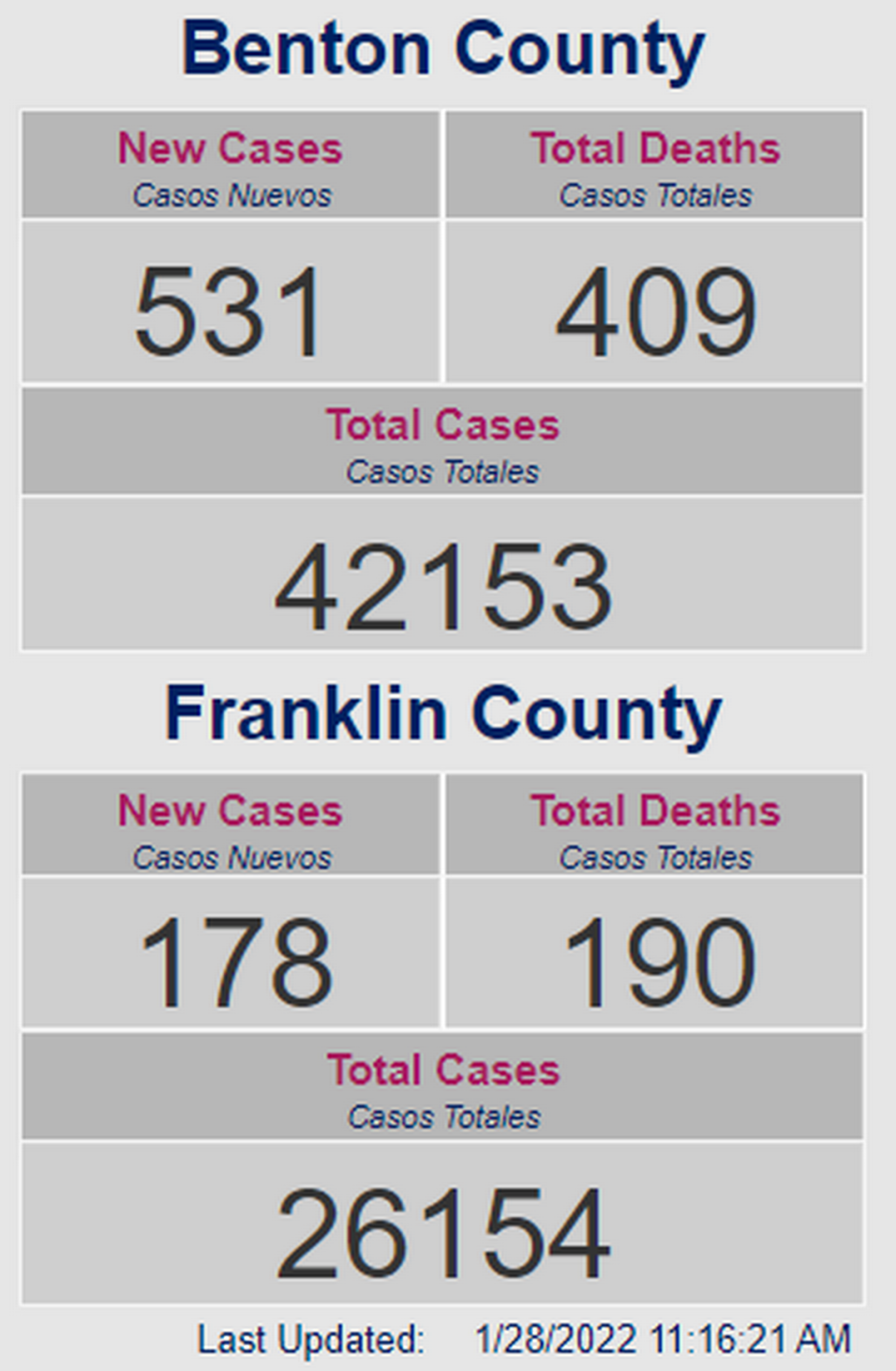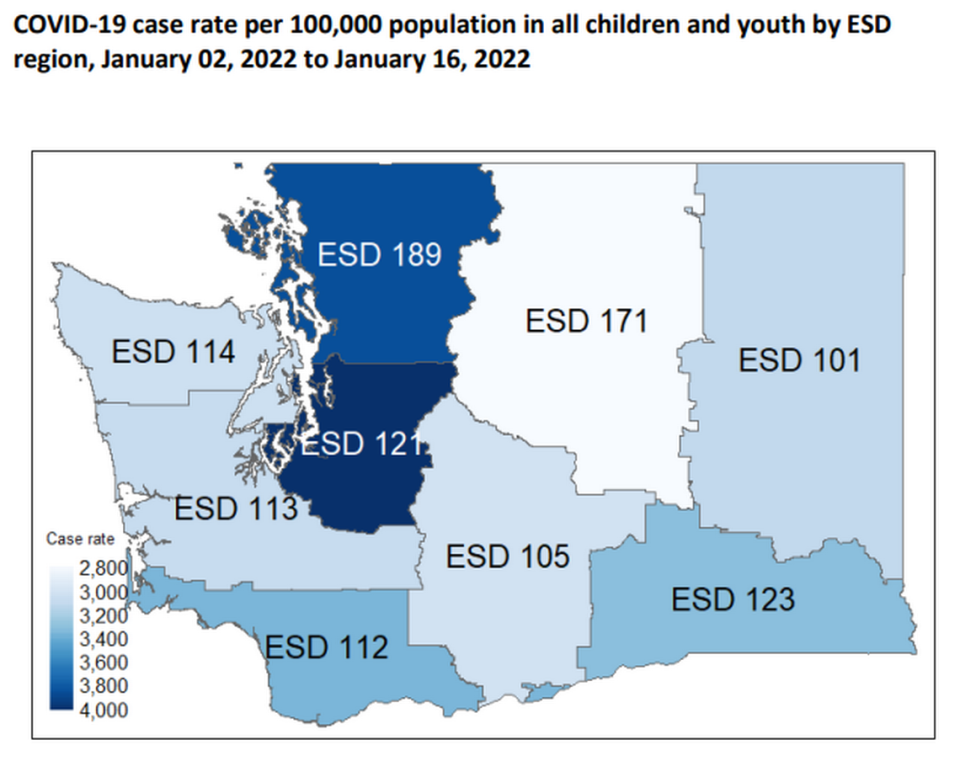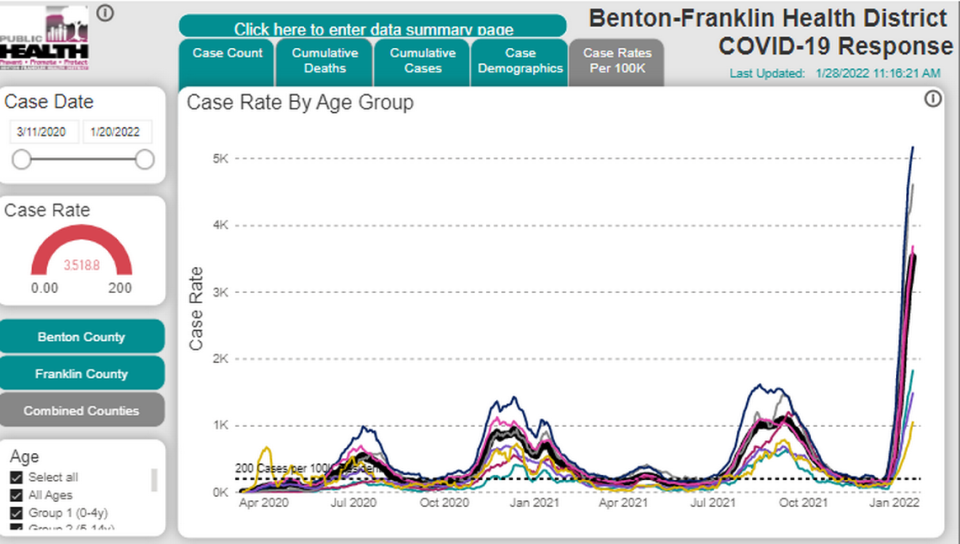‘Stretched to their limit.’ Tri-Cities yet to hit COVID peak with hospitals nearly full
- Oops!Something went wrong.Please try again later.
People continue to die from COVID-19 in the Tri-Cities area as the number of new cases confirmed each day in Benton and Franklin counties averaged more than 1,000 over the last week.
Public health officials suspect that the wave of new cases due to the omicron variant has yet to peak in the Tri-Cities area.
“In our area I believe we are still on a little bit of a rough ride for at least another week or two,” said Dr. Amy Person, health officer for Benton and Franklin counties, in an interview with the Benton Franklin Community Health Alliance.
Area hospitals, some near capacity, may not get some relief for even longer.
The peak demand for hospital care could follow the peak in new cases by about two weeks, said Dr. John Matheson, medical director for Kadlec’s emergency departments in Richland and Kennewick, speaking on the Kadlec on Call podcast this week.
COVID deaths
Four more residents of the Tri-Cities area have died of COVID-19, the Benton Franklin Health District reported Friday.
The newly reported deaths bring the total since the start of the pandemic to 599, including 409 in Benton County and 190 in Franklin County.

The most recent deaths included a Benton County man and a Franklin County woman in their 50s and a Benton County woman and a Franklin County man in their 70s.
The weekly death report Friday brings the Tri-Cities total for the month of January to 21.
In December, 22 people in Benton and Franklin counties died. In November, 17 COVID deaths were reported, down from 80 in October.
Local public health officials verify that deaths are due to COVID complications by checking for a positive test result and that a coronavirus infection was named as a primary cause of death on the death certificate.
It can take several weeks for the district to receive and reconcile death information due to the reporting processes of medical facilities and coroner offices and the process of issuing and releasing death certificates.
Statewide, 10,580 residents have died of complications of COVID-19 since the start of the pandemic through Wednesday’s report of the Washington state Department of Health.
Tri-Cities schools
Older teens in the Tri-Cities continue to have high rates of new cases, second only to adults ages 20 to 39.
The new case rate for teens 15 to 19 is 4,605 new cases per 100,000 people in their age group in the past two weeks, second only to adults up to age 39 who have a new case rate of 5,165, according to the Benton Franklin Health District.

Education Service District 123, which includes schools from Benton and Franklin counties to the southeast Idaho border, had the second highest new case rate for high school students among the nine education districts in the state.
It’s new case rate for middle school students was the fourth highest in the state, but case rates for elementary school students dropped to fifth highest. Just two districts had lower new case rates for preschoolers.
The Washington state Department of Health released comparisons for education districts for Jan. 2 to 16.
Case rates were highest in the Puget Sound area schools and schools to the north of there, where the highly infectious omicron variant spread earlier than in Eastern Washington.
Richland hospital full
Kadlec Regional Medical Center in Richland, the largest hospital in Benton and Franklin counties, is seeing more sick people and people who are sicker at the same time that hospital staff is out because they also have COVID-19 or are caring for ill family members.
“Our emergency departments are tapped,” said Matheson said. “They are stretched to their limit.”
It is the same at many other hospitals, he said.
The number of COVID-19 patients at the Richland, Kennewick, Pasco and Prosser hospitals climbed from 24 at the end of December to 93 on Friday, but remained below the mid-September count of 127 patients.
In recent days there have been times when Kadlec had only two or three open rooms for patients, with 20 or 30 people waiting to be seen or in ambulances headed to the hospital, he said.
Patients have to be “boarded” in the emergency department until space can be found to admit them. It means other patients wait longer to be seen by a doctor and some patients may be cared for in hallways, he said.
“We do not close the front doors of the emergency department,” Matheson said, but people should not come there for non-emergency issues that could be addressed elsewhere, such as at a clinic.
Eastern Washington has been fortunate that the omicron variant was slower to spread here than in Western Washington, helping to even out the demand for hospital care statewide, Dr. Person said.
A major concern of public health officials has been adequate hospital capacity, she said.
Now the demand is not so much for intensive care unit beds but beds on acute care wards, she said.
Public health officials continue to say that the people most likely to be hospitalized or die for COVID-19 treatment are those who are not fully vaccinated.
Tri-Cities COVID cases
Benton and Franklin counties had 7,217 new cases of COVID-19 reported over the last week to public health officials for an average of 1,031 new cases per day.
“The numbers are not good. They are very, very high,” Hill said.
The totals reported don’t take into account the many home test results not reported to the health district and ill people who do not get tested.
“We know that the actual amount of COVID in our community is probably significantly higher,” Hill said.

The new case rate has topped 3,500 new cases per 100,000 people over the past two weeks for Benton and Franklin counties combined.
That’s up from a new case rate of 199 new cases per 100,000 over two weeks as January began.
As of Friday the new case rate for Franklin County was 4,072, and the new case rate for Benton County was 3,259.
Tri-Cities vaccination rate
COVID-19 vaccination rates continue to lag the state. Some 63% of Washington residents are fully vaccinated. That drops to 53% in Benton County and 48% in Franklin County.
The two counties are more similar if just residents 12 and older who are fully vaccinated are compared.
In Benton County 63% of those residents are fully vaccinated compared to 61% in Franklin County. Statewide 74% of residents 12 and older are fully vaccinated.
COVID testing
At the drive-thru testing site off Argent Road at Columbia Basin College in Pasco, 47% of test results are coming back positive, and the rate of positive sites at the walk-up testing site on George Washington Way in Richland is 45%.
The high rates come as both sites have asked people to only get tested there if they have symptoms or suspect they might have been exposed.
Both sites were busy, with the Pasco drive-thru testing about 13,300 in two weeks and the Richland site testing about 4,100.
For more information on where to get tested, go to covid19.bfhd.wa.gov/testing-sites.
People who test positive should tell family, friends and co-workers they spent time around in the two days before symptoms appeared, a window when they could have transmitted the virus, Hill said.
Public health officials continue to urge people to wear masks, saying their usefulness in preventing or slowing the spread of the coronavirus is well documented in scientific papers.
“Put a mask on to protect those around you,” Hill said.
